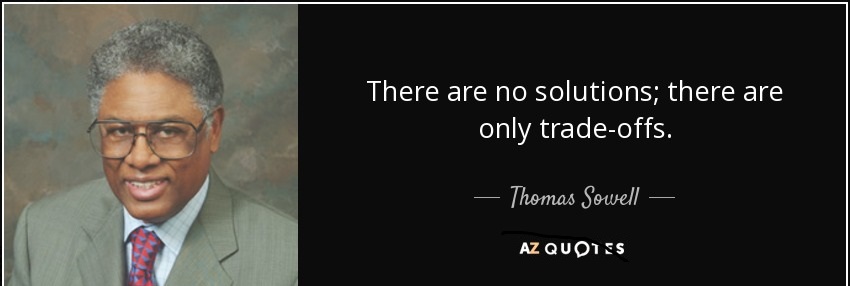Competent and honest people in the world of public policy understand that decisions have costs and benefits.
Simply stated, there is no such thing as a free lunch, though politicians like to pretend otherwise (to cite an especially absurd example, the Biden Administration is actually claiming that a multi-trillion dollar expansion of the welfare state has “zero cost”).
One of the more perverse examples of free-lunch thinking is the campaign in Washington against the use of electronic cigarettes (usually referred to as vaping).
Rational and sensible people understand that vaping has big benefits (regular cigarettes are a far more dangerous way of enjoying nicotine), while also recognizing potential costs (some people who would not become smokers might choose to vape).
Sadly, both politicians and bureaucrats myopically fixate on the potential costs while paying little or no attention to the tangible benefits.
Regarding politicians, Alan Viard of the American Enterprise Institute criticizes Democrats in the House of Representatives for pushing a tax on vaping.
The proposal would apply the federal tobacco tax to e-cigarettes for the first time. (The tobacco tax rate would also be doubled). Under the proposal, e-cigarettes would be taxed based on their nicotine content. Linking the tax to nicotine is misplaced… As Satel has commented, “The virtue of vaping is that it uncouples deadly smoke from nicotine, which, contrary to common impression, has no appreciable role in causing cancer.” …e-cigarettes offer a life-saving alternative to cigarettes, enabling smokers to more easily quit their deadly habit. …two academic research studies…found that e-cigarette taxes have increased cigarette smoking. Another recent study, which was funded by the National Institutes of Health, similarly found that “higher e-cigarette tax rates increase traditional cigarette use.” …Taxes should reduce smoking, not increase it. E-cigarette taxes pose a threat to public health.
Regarding bureaucrats, Jacob Sullum explains for Reason that the notoriously incompetent Food and Drug Administration is strangling the e-cigarette industry with red tape.
Electronic cigarettes, which deliver nicotine without tobacco or combustion, are the most important harm-reducing alternative to smoking ever developed, one that could prevent millions of premature deaths in the United States alone. Yet bureaucrats and politicians seem determined to negate that historic opportunity through regulations and taxes that threaten to cripple the industry. …the Food and Drug Administration (FDA)…says…every vaping device and nicotine liquid sold in the U.S. is “marketed unlawfully” and “subject to enforcement action at the FDA’s discretion.” …it is not enough for a manufacturer to show its products are far less hazardous than conventional cigarettes. Nor is it enough to show that nontobacco flavors are enormously popular among former smokers, because the FDA might still conclude, however implausibly, that the risk of underage consumption outweighs the welfare of smokers interested in making the potentially lifesaving switch to vaping. …The folly of the obsession with preventing underage vaping was apparent in San Francisco, where a ban on flavored ENDS seems to have boosted smoking by teenagers and young adults.
By the way, this is a global issue.
As you might predict, the notoriously incompetent World Health Organization is on the wrong side.
In a column for CapX, Mark Oates explains how that bureaucracy needs to be slapped down.
The World Health Organisation has once again defied scientific advice by baldly stating that ‘E-cigarettes are not proven cessation aids’. The WHO’s stance flies in the face of all the available evidence. …with around 7 million people dying every year due to smoking-related illnesses, getting policy right in this area could have a huge impact. …we appear to be fighting a losing battle against an international consensus to over-regulate or even ban vaping products which are proven to be the most successful and popular quitting aids available.
And some nations are imposing anti-science policies.
In a column for the Sydney Morning Herald, Alex Wodak and Colin Mendelsohn explain that Australia is about to make a big mistake.
Every year, 21,000 Australians die prematurely from smoking cigarettes. That is more deaths than from alcohol, plus prescription drugs, plus illicit drugs, plus road crash deaths, plus HIV, plus suicide. Governments have moral and health obligations to reduce smoking-related deaths by adopting policies that minimise the harm caused by the inhalation of tobacco smoke. …Currently Australians can import nicotine liquid for vaping from overseas or purchase it from a small number of participating pharmacies… From October 1, importation of nicotine liquid will be closely monitored by the Australian Border Force. …the problem is that in Australia, nicotine for vaping is treated as a medicine regulated by the Therapeutic Goods Administration, or TGA. The TGA includes nicotine liquid for vaping in the Poisons Standard while explicitly excluding cigarettes. The net effect is that a much less dangerous way of consuming nicotine is highly restricted while cigarettes, responsible for the deaths of up to two of every three long-term smokers, are readily available from 20,000 outlets.
I’ll close by reiterating that vaping should be defended because it saves lives.
From a cost-benefit perspective, people who want nicotine definitely should vape rather than smoke.
But I also can’t resist making a liberty argument.
Even if vaping was dangerous, it should still be legal. Adults should be free to make choices about the risks they incur.
That means they should be allowed to engage in all sorts of risky behaviors, such as parachuting, eating unhealthy food, hang gliding, smoking, and scuba diving.
And they also should be free to engage in not-so-risky behaviors, such as vaping.
P.S. The vaping tax is a blatant violation of Biden’s promise not to impose taxes on people making less than $400,000 per year, though I imagine nobody is surprised that he was lying (a bipartisan problem in Washington).







